Turning twigs, leaves and bits of vegetables and fruit into gorgeous rich compost which helps plants grow is one of the natural world’s magic tricks! Learn how with our wonderful collection of hint, tips and videos below, including from Devon’s very own Dr Compost – Nicky Scott.
Composting is really good for the environment as it recycles nutrients so plants can use them again. It is part of a natural process called nutrient recycling, as shown in the diagram on the right.
If you’re a school composting could also save you money by reducing the cost of someone picking up your bin. Devon has supported schools for many years to compost their cooked food waste as well as peels and cores.
Composting can also be a fantastic learning resource which can support many curriculum areas. It can get kids out of the classroom, learning practical, useful science. Whether your topic is minibeasts, habitats, micro-organisms or global warming, your compost bin can provide hands-on learning opportunities for pupils of all ages.



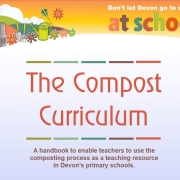


 This guide has been written for schools interested in composting their cooked food waste as well as cores and peels.
This guide has been written for schools interested in composting their cooked food waste as well as cores and peels.